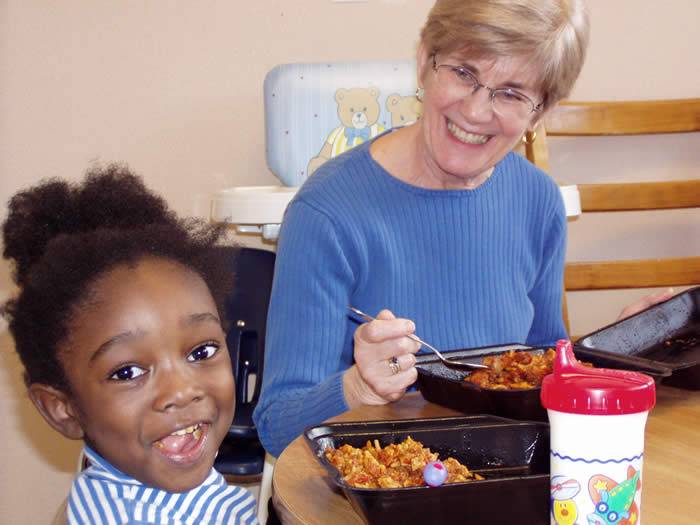Last Friday you may have read an article in the Gazette wherein Kim Gollings, Volunteer Coordinator spelled out the importance of local volunteers to Crisis Nursery during the summer months. If you haven’t checked it out, you should do so as it illustrates just how much our community relies upon students from the U of I to support integral services such as the Crisis Nursery. According to Lynn Peisker who coordinates volunteers for the United Way of Champaign County, this number can drop by as much as 90 percent, which is of serious concern to an agency that does as much as the Crisis Nursery does with as little as they do it with. So with this in mind, I traded a few electronic missives with Kim to see just what her agency does, and what it takes to help.
Let’s start with a simple one: what is the Crisis Nursery and who do you serve?
Crisis Nursery is a short term emergency shelter for children birth through five. Crisis Nursery is committed to creating an “Island of Safety” dedicated to the prevention of child abuse and neglect through the provision of emergency intervention, respite care and support to families in crisis. We are the only 24-hour, 365-days a year child abuse prevention and family support agency of its kind in Champaign County.
Crisis Nursery’s clients are children whose families are experiencing a crisis/emergency and have no support resources available at the time. A secondary client is the family entity. Every family has a different crisis, a different story and children in those families can be at risk of harm. Keeping children safe from harm’s way and strengthening the family is at the heart of preventing child abuse and neglect.
 Your agency uses quite a few volunteers. What percentage of your services are dependent upon community involvement?
Your agency uses quite a few volunteers. What percentage of your services are dependent upon community involvement?
That is a hard question to answer. If we are talking direct crisis care our ratio is 3:1, which means if we can take up to three children we need four adults here at all times. We always have two staff on the crisis care floor with children and volunteers. This means to be able to take 12 children we also need two volunteers here at all times. So if you look at it this way, to take the maximum number of children and to always be within our ratio, 50% of our crisis care comes from volunteers.
Where it is challenging for us, is that we try never to send children away, but if we are at our ratio capacity there are times that we have to.
Can you think of some specific reasons Crisis Nursery clients have made use of your services?
A crisis can look very different from family to family. Our clients utilize our services in situations that they deem as a crisis for them. Specific situations that we encounter on a weekly basis include domestic violence situations, (a mother reaching out to us trying to find a safe place for her child) a homeless situation, (where a family lacks the means to provide a shelter at night and contact us to provide a warm bed for their children), or high family stress or mental health issues (a mother or father suffering from depression seeking care for their children to enable themselves the opportunity to seek health for their own wellbeing). Our clients also utilize our parenting classes, through our family specialists to gain respite time and gain more knowledge and support as parents.
How do you define your role in C-U’s current system of care?
Our role as an agency in C-U is mainly a preventative service. Our mission is to prevent child abuse and neglect while nurturing and supporting our families and children using a non-judgmental, strength-based approach.
How reliant are you on state funding?
[According to] our 2010 Fiscal year report, 32% of our budget is reliant on the state government funding.
How do you generally go about recruiting volunteers?
Recruitment is done in a variety of ways. The Nursery has used the CU Volunteering website, our own website and the newspaper to reach out to volunteers in the most recent past for summer volunteering opportunities. We also seek out public speaking opportunities at events around the community to spread the word about volunteering. Additionally, The Nursery works in conjunction with the University of Illinois to recruit students through community service hours for classes. This summer you will see us around the Urbana Farmer’s Market on a few Saturday mornings hoping to build up our community volunteer base.
What is the typical commitment that you ask of your volunteers?
We ask our volunteers to commit to us at least three months of service. That includes one, 2 hour shift each week. We try to be very flexible with scheduling and work around everyone’s busy schedules to find a time block that works for them. Along with this, we adhere to DCFS guidelines which means some paperwork for our volunteers. We ask that our volunteers complete all the given paperwork within one month of their orientation dates.
If someone can’t commit to volunteering, is there any other way they can help?
Absolutely! In order to keep our services free to the public and keep our doors open, we rely on monetary donations from our community as well as donations of food and supplies from the community. You can visit our website, http://www.crisisnursery.net to see our immediate needs list for donations. We do ask that donations are dropped off between 9 a.m. and 5 p.m. Monday through Friday to make it easier on our crisis floor staff.








